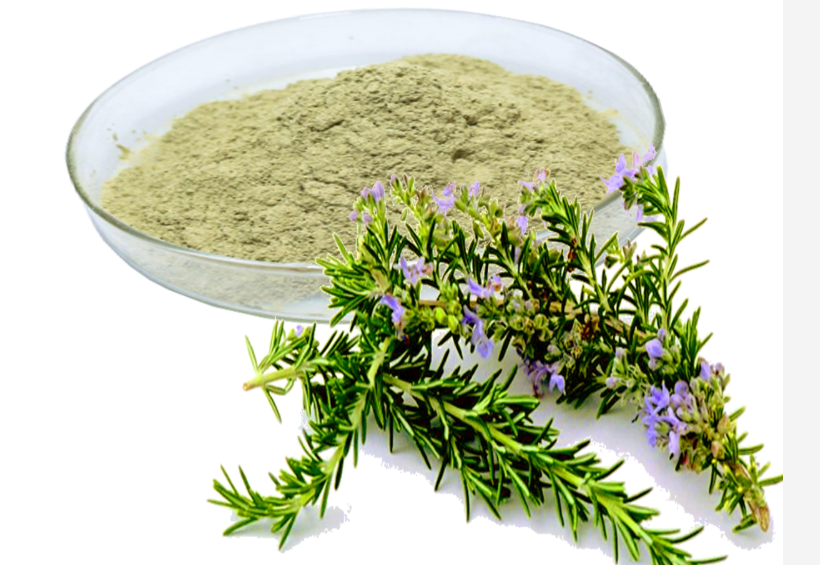




Rosemary Extract
PRODUCT DESCRIBTION
Product Name: Rosemary Extract
Latin Name: Rosmarinus Officinalis
Specification: 5%-30% Rosmarinic acid, 10%-95% Carnosic acid, 25%-98% Ursolic acid, 10%-20% Carnosic acid oil
Test Method: HPLC
Molecular Formula: C20H26O5
Molecular Weight: 346.42
CAS No: 80225-53-2
Description:
The extract is from rosemary (Rosmarinus officinalis Linn.), a common household plant that has grown in the Alps since the Middle Ages, and is now found throughout the world. According to folklore, rosemary takes its name from the Virgin Mary, who draped her cloak on a rosemary bush, and then placed a white flower on top of the cloak. The flower turned blue overnight, and the plant became known as the "Rose of Mary."
Rosemary has been used for thousands of years as a savory spice, food preservative, in cosmetics and hair products, and as an herbal medicine for a variety of health disorders. Until now however, the exact chemical pathways involved in its beneficial effects have remained unknown.
There are hundreds of research papers and studies on the extensive antioxidant capabilities of rosemary. Before retiring from the U.S. Department of Agriculture, botanist Dr. James Duke established the landmark Phytochemical Database that lists all the known chemical compounds in more than 1,000 edible plants, including the most common herbs and spices. According to Duke, rosemary contains more than two dozen antioxidants, and it is the only compound in his database (CRC Handbook of Biologically Active Phytochemicals, 1992) to have immune regulating, anti-inflammatory, and antioxidant activities.
Although rosemary extract has been used commercially as an antimicrobial food preservative for years, now we know for certain that it also has a lot to offer as a nutritional supplement, especially in the prevention of some types of cancer, allergies, and the progression of Alzheimer’s disease.
Main functions:
1.Antioxidation.
2.Rosmarinic acid has strong free radical scavenging activity and antioxidant activity.
3.Antidepressant effect.
4.Rosmarinic acid has antidepressant effect on animal model of depression.
5.Bacteriostasis of rosmarinic acid.
6.Rosmarinic acid has broad-spectrum antimicrobial activity, which can inhibit bacteria and fungi.
7.Anti inflammatory effect of rosmarinic acid.
Application:
1.Food & Beverage:
Natural preservative & antioxidant:extend shelf life, stabilize the appearance and preserve taste.
· Oils and fats/ Drinks & beverages/ Fish products/ Confectionery products/ Meat products/ Sauces
2.Nutritional Supplements:
Antioxidant, eliminate free radicals, anti-aging, etc.
· Capsules (hard & soft)/ Tablets/ Powder/ Tinctures/ Pills
3.Personal Care Products:
Anti-bacterial, Antioxidant, Anti-aging, etc.
· Shampoo/ Facial cream/ Facial mask/ Soap/ Body lotion/ Cleaning foam/ Shower gel
4.Animal Food Additives:
Spec: Carnosic acid oil 5%, 10%; Rosmarinic acid powder 5%.
Anti-oxidation, improve immunity and growth performance, improve meat quality.
Animal food/ Pet food:Recommended usage: 0.003%-1%